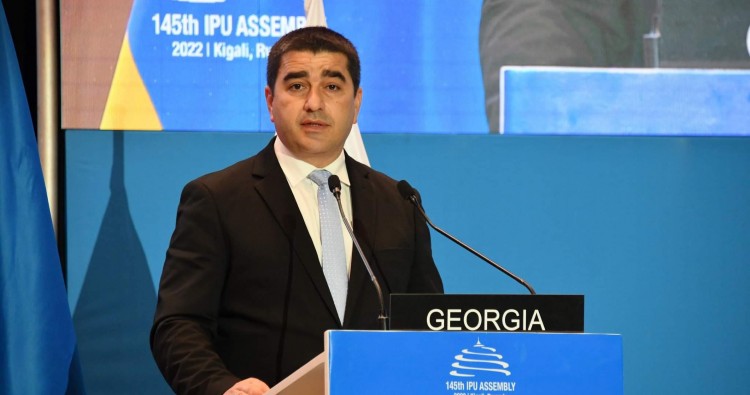Georgian parliament speaker: parliaments can make “significant” contribution to women's empowerment

Papuashvili also emphasised that, as part of the European Union accession process, the gender equality council and the human rights and civil integration committee have been jointly working on changing and updating the state concept and the law on gender equality. Photo: Parliament of Georgia
Parliaments can make a “significant” contribution to women's empowerment, “gender-sensitive” parliaments can implement relevant changes and build more equal, sustainable societies, the Georgian parliament speaker Shalva Papuashvili said on Wednesday during his speech at the 145th Inter-Parliamentary Union assembly in Rwanda.
Papuashvili said that working on gender equality issues has become “more important”, taking into consideration various modern crises, including the military conflicts, health crisis and their socio-economic consequences, “particularly” affecting women.
 Photo: Parliament of Georgia
Photo: Parliament of Georgia
The parliament speaker focused on the steps taken by Georgia in the direction of promoting gender equality and women's empowerment, noting that the country had “strengthened” the national institutional framework and created “strong” institutional mechanisms, while also making changes to several laws: criminalising stalking, adopting a new definition of sexual harassment, legislation outlawing forced marriage, and more.
Papuashvili said the adoption of the law on the elimination of all forms of discrimination in 2014 has been a “remarkable” step in the modern history of Georgia towards “better” regulation of gender equality, and pointed out that the country has been working on the harmonisation of the national legislation after the ratification of the so-called Istanbul Convention - the Council of Europe convention on preventing and combating violence against women and domestic violence - in 2017.
Honoured to address the @IPUparliament in Rwanda on gender equality. Gender sensitive parliaments can make our societies more resilient, equal and prosperous. Georgia has made significant progress in recent years, and pledges to be even more ambitious in this regard. pic.twitter.com/bAYIJDrWVP
— Shalva Papuashvili ???????? (@shpapuashvili) October 12, 2022
The Georgian official highlighted the “important” changes in Labour law, made in 2020, which involved paid maternity leave and employer’s obligation to provide equal pay to women and men, and stressed the “most important step” taken for increasing women's political participation - the introduction of mandatory gender quotas, as a result of which the number of elected women has “almost doubled”.
To make progress towards gender equality, parliaments must be gender-sensitive in terms of their composition, structure and day-to-day activities. The Georgian parliament has developed a methodology to assess the gender sensitivity of the Parliament. Such evaluation helped us to define future priorities, including the issue of gender budgeting”, Papuashvili said in his speech.
 Photo: Parliament of Georgia
Photo: Parliament of Georgia
Papuashvili also emphasised that, as part of the European Union accession process, the gender equality council and the human rights and civil integration committee have been jointly working on changing and updating the state concept and the law on gender equality.
Current parliamentary discussions focus on important legislative initiatives, including the introduction of gender impact assessments, the expansion of the list of persons with single parent status, and others. In addition, in view of the fact that we pay a lot of attention to the economic empowerment of women, we intend to initiate and adopt the concept of economic empowerment of women”, the parliament speaker added.
 Tweet
Tweet  Share
Share